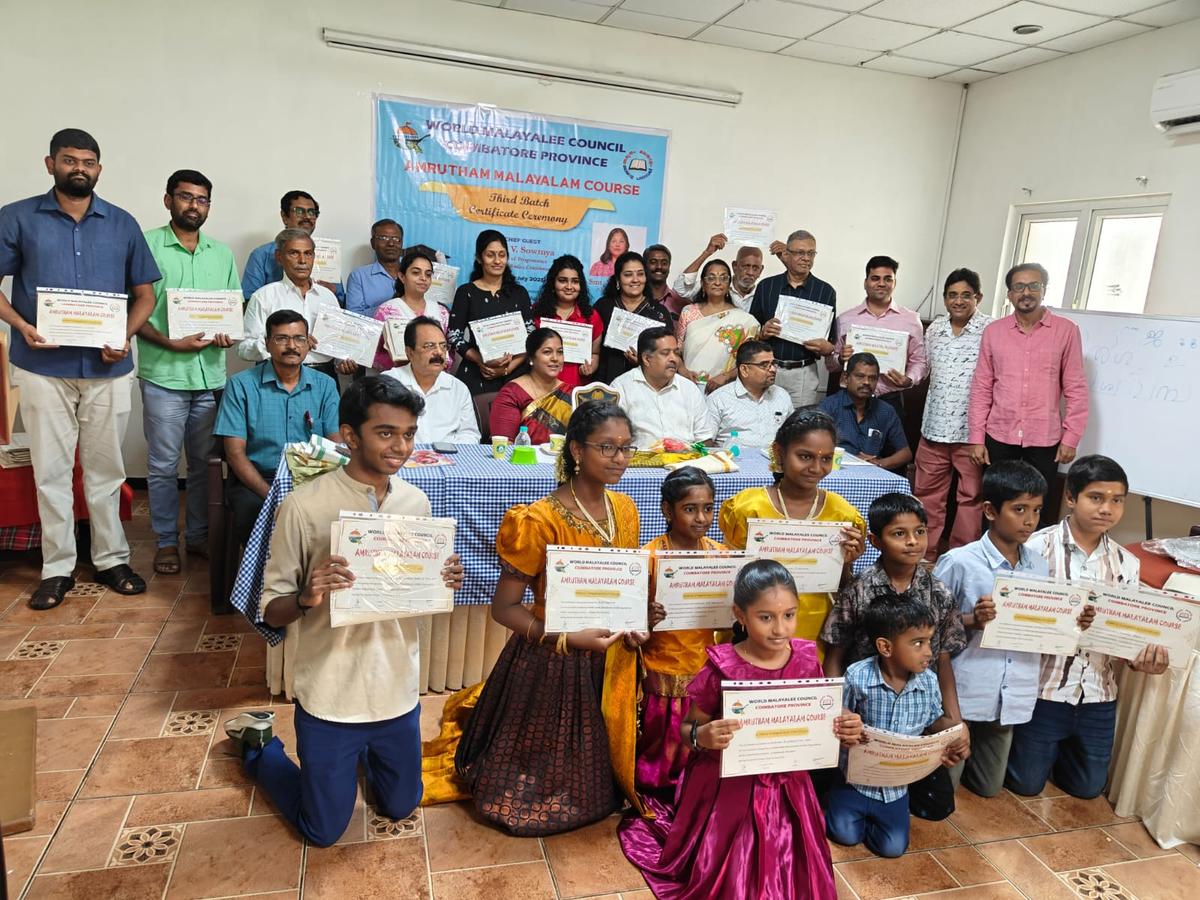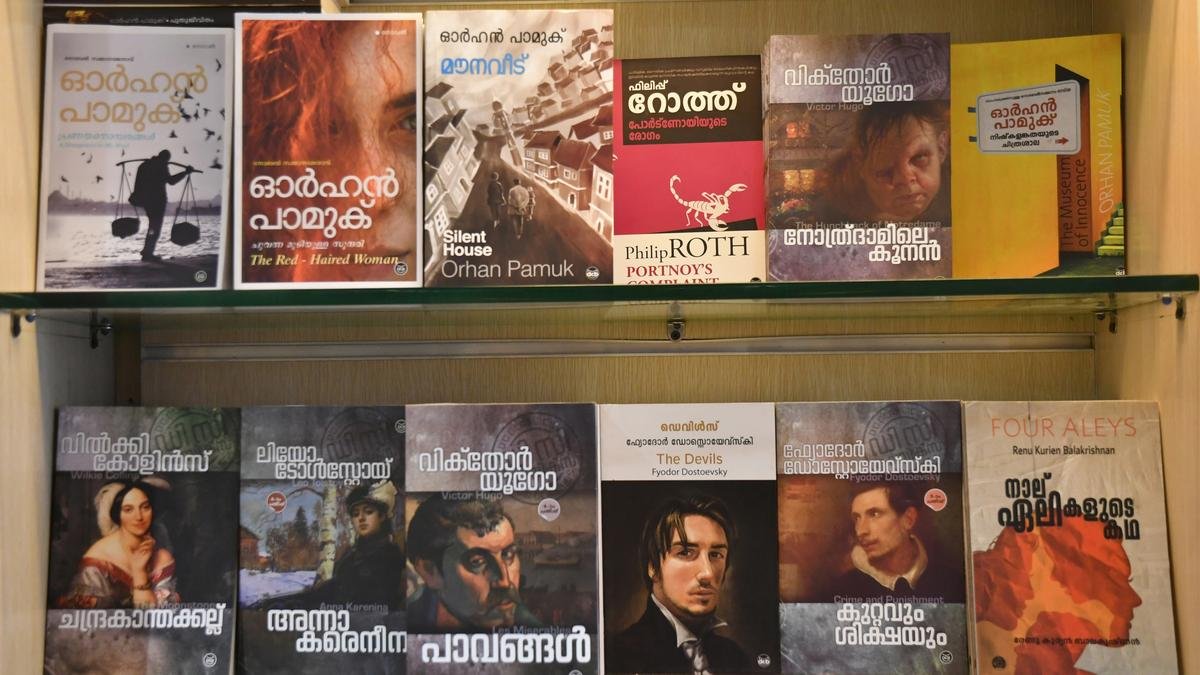
Every year, a number of non-native speakers attend the classes to understand Kerala’s art and culture, its landscape, people and literature
| Photo Credit: THULASI KAKKAT
“Learning a new language can be an unforgettable experience,” says award-winning Malayalam teacher E C Sabu as he recounts his recent telephone conversation with one of his students. “A Telugu speaker, she completed her Malayalam certificate course more than a decade ago. She has now enrolled her son for the online classes,” he shares over a phone call from his home-town Pala in Kerala adding that language courses often leave a lasting impact. “Learning Malayalam has touched her life and now she wants to pass on the knowledge to her child. What happens in our classroom is cultural diffusion. It brings people from multi-cultural backgrounds and promotes oneness.”

Sabu, who served as vice-principal, later as principal of CMS Higher Secondary School before retiring from active teaching this May, is a recipient of many awards including ‘Panditha Sresta Award’ for his service in the education sector. With over 35 years in active teaching, he is set to teach the fourth batch of Amrutham Malayalam, an online eight-month certificate course offered by the World Malayalee Council, Coimbatore Province.

Students with their certificates
| Photo Credit:
Special Arrangement
The virtual classroom is a melting pot of cultures and friendships. Every year, a number of non-native speakers attend to understand Kerala’s art and culture, its landscape, people and literature. N Deepa Saravanan, assistant professor at Kumaraguru College of Liberal Arts enrolled to prepare for a doctorate thesis on comparative literature of Tamil and Malayalam. “I picked 100 stories of Malayalam writer C V Balakrishnan and Tamil writer Nanjil Naadan for my research. As Balakrishan’s works are available only in Malayalam, I learnt Malayalam through the course. I have now translated as many as 10 of his stories in Tamil including MTV’s short story Oru Athyapakan Janichu from his collection Irttinte Aathmavu.”
For Dhanya Anand, a German teacher based in Chennai, the course helped her draw comparisons with German and Malayalam cultures. “I ensure that I read one page of Malayalam comic series Bobanum Moliyum every day to stay connected with language.”

“It’s a positive story to have emerged out of the pandemic,” says Vijayan Cheruvassery, general secretary of the Council, reflecting upon the beginnings of the online classes. “We have got three enquiries from Amsterdam for the new batch. From the previous batch, one of our students from South Africa relocated to Calicut and continued her schooling here. Since she was already familiar with the language, it helped her score 88 percent in Malayalam exams at school. Many youngsters join to catch nuanced humour of Malayalam films. Another retired English professor calls this learning, her second childhood and hopes that it delays the onset of Alzheimer’s.”
Rajesh Kumar who got the course rolling during his tenure as president of the Council says the response has been overwhelming. “Since Malayalee population is spread out far and wide, there is a growing interest to understand Kerala’s culture, literature, and films. The course has reached out to children, professionals, school principals, and bureaucrats too, especially during their posting in Kerala as it helps them understand people’s issues better. Sabu’s teaching works like magic.”
For many, it is works of Malayalam literary stalwarts like M T Vasudevan Nair, Vaikom Muhammad Basheer, Tagazhi Sivasankaran Pilla and Sugathakumari that draws them to the course. “They are intrigued when they learn about Jnanpith awardees and want to relish their celebrated works in Malayalam. It breaks barriers and opens doors to the rich landscape of Kerala,” explains Sabu. One of his past students, P Chellappan, a retiree who started his career at Defence Accounts at Madhya Pradesh, says, “The way he introduces words and letters quoting examples from literary works and poems makes it a memorable experience.” For S Viswaroop, urologist with Vedanayagam Hospital in RS Puram, the course strengthened his bond with his patients from Kerala. “Sabu Sir is a passionate teacher, always punctual and sincere and has a unique teaching methodology. It rubs on to us.”
Vijayan likes to call it ‘magical learning’. “His teaching methodology is simple, yet so in-depth.” Sabu says learning never stops for his students. “Their WhatsApp groups are buzzing as they share audio notes of reading Malayalam passages. For non-native speakers, especially those who speak Tamil, they are conditioned to use ra, cha or la in a particular way and get confused as they constantly compare. I address these issues right at the start,” he says, adding, “ The excitement I see on their faces while reading in Malayalam is what keeps me inspired.”
The classes begin from October 2. Call 9486477891/ 9994531441

Published – September 29, 2025 07:19 am IST
